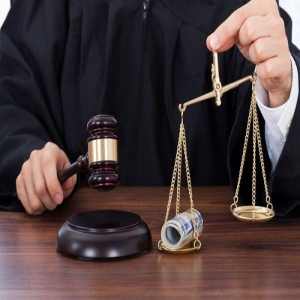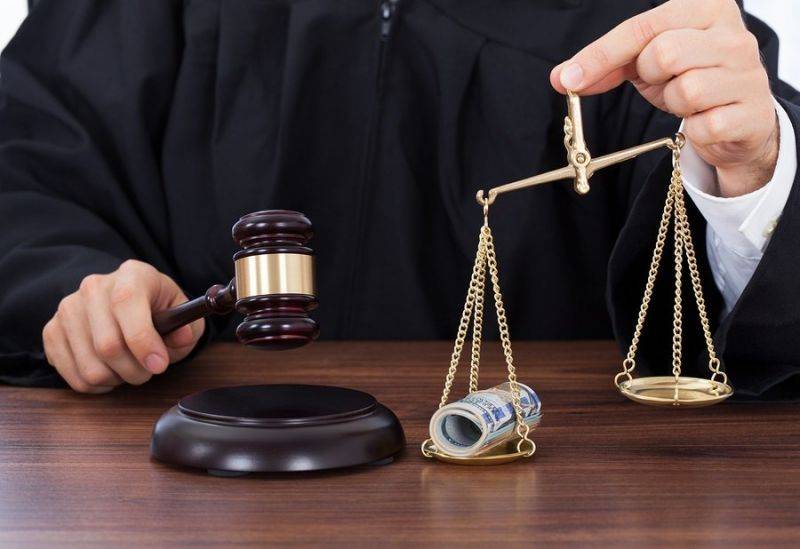
.jpg) Justice (Retd) Aloysius S. Aguiar
Justice (Retd) Aloysius S. Aguiar

Five years after my appointment as a judge of the Bombay City Civil and Sessions Court, Greater Bombay, I was designated a special judge for trying cases under the Prevention of Corruption Act, investigated by the Central Bureau of Investigation (CBI). Cases involving corruption by public servants in the service of the Central Government were investigated by the CBI, while those against state government servants were investigated by the State Anti-Corruption Bureau, which has its own special court.
That there was corruption in the lower Judiciary, though not rampant, was well known. The Chief Justice of India, Shri SP Bharucha, after his appointment sometime in 2001, made a statement pegging corruption in the lower Judiciary at about 20%. I suppose the Bombay High Court, considering my track record, recommended my appointment as a CBI Special Judge for trying cases under the Prevention of Corruption Act.
Prior to that, I had been assigned to the trial of a high-profile case against an Aircraft Technician for attempting to sabotage the Aircraft VTDPM while it was being serviced to carry the then Prime Minister, Mrs Indira Gandhi, on a foreign trip. The case was investigated and being prosecuted by the CBI. After examining the evidence in great detail, I acquitted the accused. In appeal, the Bombay High Court upheld my judgment and order.
While I was the Principal Judge of the Bombay City Civil and Sessions Court, I received several anonymous letters pointing out the corrupt acts of some of my colleagues. These letters could have been part of a vilification campaign against some good judges. But it is a fact some two or three judges were known to be corrupt.
As Principal Judge, it was within my domain to fix the roster appointing judges to hear and try various cases on both the civil and sessions sides during regular court Hearings, as well as after court hours, during holidays, and during court vacations. The regular court hearing roster was changed every six to eight weeks.
There was a prevailing dichotomy between Final Hearings (Trials) and Notices of Motion (Interlocutory matters). A trial, whether civil or criminal, sometimes took days to dispose of, while Notices of Motion for Injunctions (interim or ad-interim) and Bail and Anticipatory Bail matters were disposed of within hours and even within minutes. The turnover for a corrupt judge taking up interim and ad-interim Applications for hearing was quick and plentiful.
In one such roster change, I reassigned a reportedly corrupt judge who was handling Notices of Motion for trial of suits for hearing and final disposal. The judge was visibly upset with his change of assignment and met me two or three times, requesting that he be reassigned to hear interlocutory matters. I had to report him to the High Court.
Corruption in the Judiciary is often the result of collusion between some members of the Bar and some on the Bench, either directly or through intermediaries.
The liberty to grant ex-parte stay orders and injunctions in civil matters, especially regarding unauthorised constructions in Mumbai and bail and anticipatory bail matters, exercised by some judges assigned to take up urgent matters after court hours and on Sundays and holidays was so misused that about half a dozen fly-by-night lawyers set up the business of obtaining such reliefs by charging exorbitant fees, part of which they claimed to be sharing with the judge.
The corrupt acts of some judges often result in the entire Judiciary being painted with the same brush, creating a public perception that all judges can be bought. Lawyers capitalise on this perception to extract more money from their clients to bribe the judge.
I believe I was a victim of this mistaken perception when I acquitted the accused in a murder case due to lack of evidence. After I pronounced judgment and returned to my chamber, which was attached to the court, the young, shady-looking lawyer for the accused person came to my chamber. I stopped him at the threshold and asked him what he wanted. He said, "Nothing. I just want to thank you." I said there was no question of thanking me.
After the lawyer left to meet his clients, who were seated in the courtroom during the trial and the pronouncement of judgment, it struck me that the lawyer had come to my chamber with the sinister object of convincing his clients that he had procured the acquittal of the murder accused.
When we talk of corruption, the general perception is that it involves financial misdoings, where money passes hands as and by way of 'quid pro quo.' Under the Prevention of Corruption Act, public servants are prosecuted for demanding and accepting bribes after they are caught red-handed doing so in a carefully laid trap. Public Servants can also be charged if found in possession of vast sums of money and other assets which are disproportionate to their known sources of income.
Judges are public servants and, therefore, are subject to prosecution and trial under the PC Act, provided that prior sanction is obtained from the Government under Section 197 of the Criminal Procedure Code. Apart from prosecution under the PC Act, the judge is subject to the disciplinary jurisdiction of the High Court and can be proceeded against under specific circumstances or for violation of ethical guidelines.
As Principal Judge of the Bombay City Civil and Sessions Court, I had the unpleasant task of serving disciplinary orders from the High Court on a colleague who was trying a murder case against a member of a well-known underworld gang. The judge was asking the don to help him recover a large sum of money from a debtor. The telephonic conversation had been tape-recorded by the police.
A sitting High Court Judge, though a Constitutional Authority, is not immune from prosecution under the Prevention of Corruption Act. However, there are procedural safeguards that must be met before a criminal case can be registered. In K Veerasami v. Union of India, the Supreme Court ruled that no FIR can be filed against a High Court Judge under Section 154 of the CrPC without prior consultation with the Chief Justice of India, and the President of India can grant sanction for prosecution based only on the recommendations of the Chief Justice of India.
When Chief Justice SP Bharucha made the statement about corruption in the lower Judiciary sometime in 2001, he was silent about corruption in the higher Judiciary. Judicial corruption, in the sense of financial corruption, of money passing hands for favourable orders, was unheard of. However, there are shades of corruption, ranging from a simple acceptance of gifts with no quid pro quo to being found with oodles and oodles of unaccounted cash and wealth.
If there is no quid pro quo, can it be said that the judge is corrupt? Again, if the judge accepts a gift in cash or in kind given by a litigant with the expectation of receiving favourable orders but rules against them, can the judge be held guilty of corruption?
In England, Francis Bacon, the Lord Chancellor, was at the pinnacle of his fame in 1620, but his acceptance of 'gifts' in two cases with the promise of favouring the donors but failing to do so led to his downfall.
In the first case, Mr Aubrey had filed proceedings in Chancery against Sir William Brooker, but the case never seemed to come up for hearing. On advice, Aubrey, through intermediaries, gave the Lord Chancellor a sum of 100 Pounds, which he accepted with the promise of passing favourable orders. Since the case did not come on for some time, Aubrey wrote reminder letters to the Chancellor, which seemed to have upset him. When the case did come up, Aubrey was shocked to find "a very prejudicial and murdering order" made against him.
In the second case, Edward Egerton, who was suing his brother, Sir Rowland Egerton, presented the Lord Chancellor with a bag full of 400 Pounds in gold sovereigns. The Chancellor accepted the gift, saying he would "favour him in all his just causes." However, when the case came to trial, he decided against Egerton and in favour of Sir Rowland.
In both these cases, the Lord Chancellor, Francis Bacon, had accepted the bribes and afterwards decided against the bribe givers. It was strongly suspected that Bacon had accepted bribes from the opposite successful parties as well.
Seventy years before Bacon's time, judges had been taking bribes, and Bishop Hugh Latimer roundly condemned it, saying, "They are all bribes. Bribery is a princely kind of thieving. They will be waged by the rich, either to give sentence against the poor, or to put off the poor man's cause. This is the noble theft of princes and magistrates. They are bribe-takers. Nowadays they call them gentle rewards. Let them leave their colouring, and call them by their Christian name – bribes."
Another highly respected Lord Chancellor who fell for the lure of filthy lucre was Lord Macclesfield, who, unlike Bacon, did not accept bribes. However, whenever he appointed a new Master in Chancery, he demanded an honorarium, just as his predecessors had done. He increased the price for the Office so enormously that the new Masters had to recover it, which they did by delaying the cases before them, compelling the parties to bribe them to expedite their cases.
The case of Cottenham, Lord Chancellor of the day, sets a very salutary principle - that the judge must not have the slightest interest in any case pending before him. This is based on the maxim that no man is to be a judge in his own cause.
Lord Cottenham was a shareholder in the Grand Junction Canal Company, holding 92 shares in it. In a dispute with one Mr Davies, the Vice Chancellor granted an injunction preventing Davies from obstructing the Canal. In an appeal before him, Chancellor Cottenham affirmed the decree. He did not disclose he was a shareholder in the Company. The House of Lords, after consulting the judges, held the decree must be set aside as the Lord Chancellor of England had an interest.
The last two or three decades have witnessed an increasing scale of corruption in our higher Judiciary. Some reliable sources claim that there is widespread corruption, as disclosed in conversations between lawyers in the corridors of the High Court and Supreme Court. Some limit corruption to just ten per cent of the Judges. Apart from crass corruption in the form of boxes and sacks full of cash passing hands for favourable orders, there are subtle, gentlemanly forms of corruption where no cash may change hands, but the judge is influenced by big business and politicians in positions of power who bring pressure to bear on the judge and/or offer him allurements like plum post-retirement postings.
This is a pernicious form of corruption, especially in matters of great public interest, as it undermines the Rule of Law and challenges the fundamental principles of justice, equality and fairness. A non-corrupt Judiciary is a sine qua non for upholding the Rule of Law.
The present Chief Justice of India, BR Gavai, recently speaking at a Round Table Conference in the Supreme Court of the United Kingdom, said that if a judge takes up an appointment with the Government immediately after retirement or resigns from the Bench to contest elections, it raises "significant ethical concerns and invites public scrutiny." The CJI needs to be commended for pledging, along with several other Judges of the Supreme Court, not to take up any post-retirement posting.